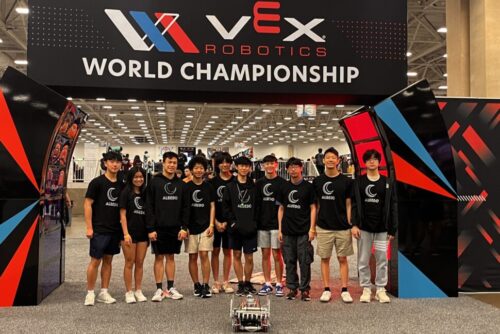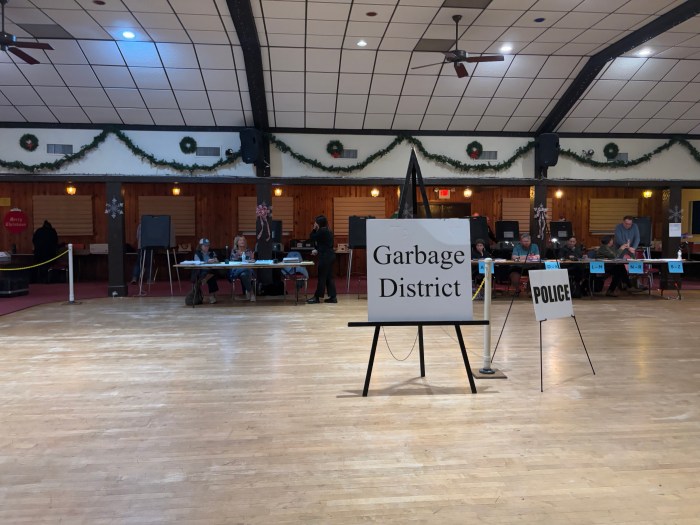Team Albedo of Manhasset places in top 6 percent at World Robotics Competition
Team Albedo, a VEX robotics team, started last year as eight sophomores from Manhasset High School who wanted to compete. Even after they were told that they were too late to start for that school year, the teens refused to be deterred. They formed a group and jumped into the world of team robotics. Now in their second year, Team Albedo has recently returned from the World Competition in Texas. They have won the Judges Award two times and the Think Award.
“We had talked to our guidance counselors about making maybe making a robotics club at school, and then they said we wouldn’t be able to do it, at least not in the timeframe that we wanted. They said we would have to wait at least a year to establish the club, but we want to start as soon as possible. So, then we decided to just get together a group of friends from our science class to start making a team independently,” said Grace, one of the team members.
The team has done everything themselves, from learning the rules to building and programming their bot, without advisors or coaches. “We went into this basically completely blind. We did not have a coach or anything. When we started, we had no clue, no idea what we were doing. We were just learning from YouTube and watching other teams. It was interesting.” Said Alex, one of the main builders.
Some elements of the competition remain the same from competition to competition, while others change. The first part is the autonomous period, not unlike compulsory moves in gymnastics. In the autonomous period, the robot executes a pre-programmed code by itself for 15 seconds. After 15 seconds, the competition enters a one minute and 45 second driver period. In this driver period, the driver operates a controller that controls the motion of the robot. Another big part of the programming is linking the buttons on the controller to a particular function on the robot. This year, the game was an over/under. In this game, the main scoring elements are plastic tri-balls in the shape of a green pyramid. The point of this period is to get as many tri-balls into a goal as possible. One of the positions on the team is the match loader, who places these elements on the field for the robot to then manipulate.
Part of designing the robot was deciding how it would manipulate the tri-balls. ” We used an intake with a rubber wheel to draw the tribal into the bot and then we would outtake, or reverse it, into the goal.” Said Roy.
Initially, the team meets to hammer out a basic design and function for the bot, before any designing takes place. The game changes from year to year, so the robot has to be designed from scratch. “The first couple of meetings are usually just us trying to figure out what kind of bot we’re trying to go for, what features it’s going to have. Then we start like building it somewhat, CADding it, creating a virtual design. Then most of the time is actually spent building it, because that takes a long time. And then afterwards, we started programming, which usually takes relatively less time.” Said Alex.
The team has already begun designing the bot for next season in CAD. “Generally you would rebuild several times within a season, because the strategy changes throughout the game and as you realize there’s better mechanisms or systems that you can use you want to rebuild the whole robot. So usually you rebuild once or twice within a season. That’s the main reason why it takes so long.” said Alex.
Being on a VEX team, especially one the members started from scratch without adult assistance, looks great for college. Additionally, the strategies learned on this team are life skills the members can take into their working life. “On your VEX team, you discuss ideas. If there’s a conflict, if a certain part of the team likes one idea, and another part of the team thinks there’s a better way to do it, then you have to talk through the thought process of each group, right? And then overall working on the robot together. Debugging, solving errors as a team, you’re building very strong teamwork skills, which can be applied later on in personal work,” said Ming.
For those considering joining a VEX team, Alex cautions that it is a commitment. “The main thing about Vex that a lot of people didn’t expect is just the time commitment it requires. You have to try to meet like four or five times every week if possible. I mean, we didn’t always meet four or five times, but you could be working on from right after school to like 12 at night. So it’s a lot of time required in order to get here.”































